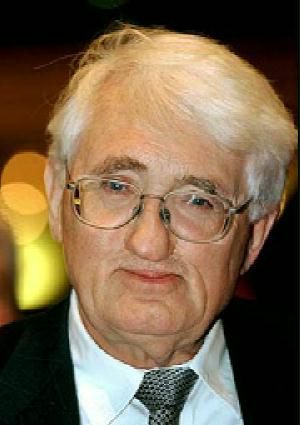
Credits, references, and bibliography

|
|
| Jürgen Habermas | http://www.youtube.com/watch?v=jBl6ALNh18Q |
Lifeworld, System, Colonization
Rationalization of System and Lifeworld: the solution?
"In his magnum opus Theory of Communicative Action (1981) he criticized the one-sided process of modernization led by forces of economic and administrative rationalization. Habermas traced the growing intervention of formal systems in our everyday lives as parallel to development of the welfare state, corporate capitalism and the culture of mass consumption. These reinforcing trends rationalize widening areas of public life, submitting them to a generalizing logic of efficiency and control. As routinized political parties and interest groups substitute for participatory democracy, society is increasingly administered at a level remote from input of citizens. As a result, boundaries between public and private, the individual and society, the system and the lifeworld are deteriorating. Democratic public life only thrives where institutions enable citizens to debate matters of public importance. He describes an ideal type of "ideal speech situation"[1], where actors are equally endowed with the capacities of discourse, recognize each other's basic social equality and speech is undistorted by ideology or misrecognition." (from, wikipedia, http://en.wikipedia.org/wiki/J%C3%BCrgen_Habermas, accessed 10/6/08 16:25.
"Jürgen Habermas's grand theory of modernity is concerned with the progress of rationalization and the possibility of achieving a substantively rational society. Habermas was trained by members of the Frankfurt School, but his theory departs from their critique of the culture industry. Habermas thought that the sphere of everyday action, in which free and open communication can take place (the lifeworld), was being colonized by the progressively rationalized structures of the system. These structures include the family, the legal system, the state, and the economy. As they grow increasingly differentiated, complex, and self-sufficient, the structures of the system increasingly constrain free and open communication. As a result, people have fewer opportunities to make substantively rational decisions based on the force of argument."(1)
The Jürgen Habermas Web Resource: https://imamsamroni.wordpress.com/2009/01/03/the-jurgen-habermas-web-resource/ (includes entries on the public sphere, discourse ethics, and modernity)
Jürgen Habermas http://www.faculty.rsu.edu/~felwell/Theorists/Habermas/Index.html
Notes on Habermas: http://www.ucalgary.ca/~frank/habermas.html
Archive at marxist.org: http://www.marxists.org/reference/archive/habermas/index.htm
1.
Much of this page comes from the "Instructor's Manual" to accompany Contemporary
Sociological Theory and Its Classical Roots: The Basics, Second Edition,
George Ritzer, Mcgraw-Hill, 2007. The Instructor's Manual was prepared by James
Murphy, University of Maryland, College Park and Todd Stillman, Fayetteville
State University. These excerpts are from chapter 5.
2. Ritzer, George. 2007/2010/2013. Contemporary Sociological Theory and Its Classical Roots: The Basics. 2nd/3rd/4th editions. St. Louis: McGraw-Hill
![]()
Unless otherwise noted, all pages within the web site http://www.umsl.edu/~keelr/ ©2015 by
Robert O. Keel.
Click here to Report Copyright Problems